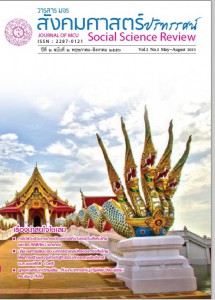นโยบายการพัฒนาระบบทหารอาสาสมัครของกองทัพไทยโดยการสร้างแรงจูงใจ เข้าสู่การเป็นทหารกองประจําการ
คำสำคัญ:
การพัฒนาระบบทหารอาสาสมัครบทคัดย่อ
การวิจัยนี้มีวัตถุประสงค์ ๓) เพื่อศึกษานโยบายการพัฒนาระบบทหารอาสาสมัครของ กองทัพไทยโดยการสร้างแรงจูงใจเข้าสู่การเป็นทหารกองประจําการ ๒) เพื่อวิเคราะห์นโยบาย ตัวแบบ โอกาส จุดแข็ง และจุดอ่อนของนโยบายทหารอาสาสมัคร และ ๓) เพื่อศึกษาผลกระทบ และนําเสนอ นโยบายการพัฒนาระบบทหารอาสาสมัคร โดยใช้การวิจัยแบบผสานวิธี (Mixed Method Res๑arch) คือการวิจัยเชิงคุณภาพ เก็บข้อมูลจากผู้ให้ข้อมูลสําคัญประกอบด้วย ผู้บังคับบัญชาระดับสูง ในกองทัพ จํานวน 6 คน ที่ได้มาโดยการเลือกแบบเจาะจง ใช้การสัมภาษณ์เชิงลึก และการสนทนา กลุ่มผู้ที่เกี่ยวข้องกับการตรวจเลือกทหาร จํานวน ๒๐ คน วิเคราะห์ข้อมูลเชิงเนื้อหาประกอบด้วย การ แปรความ การตีความ และการวิเคราะห์ สําหรับการวิจัยเชิงปริมาณ เก็บข้อมูลด้วยแบบสอบถามที่มี ค่าความเชื่อมั่น ๒,๔๓๖๓ ใช้กลุ่มตัวอย่างที่เป็นทหารกองประจําการที่สมัครใจเข้ารับราชการของ กองทัพบก จํานวน ๕๐๐ คน คํานวณจากสูตรของ ทาโร่ ยามาเน่ โดยการสุ่มแบบหลายขั้นตอน และ กลุ่มตัวอย่างของกองทัพเรือ และกองทัพอากาศ จํานวน ๑๐๐ คน โดยการสุ่มแบบบังเอิญ สถิติที่ใช้ใน การวิเคราะห์ข้อมูลได้แก่ ค่าเฉลี่ย ค่าร้อยละ และส่วนเบี่ยงเบนมาตรฐานผลการวิจัยพบว่า ) นโยบายการพัฒนาระบบทหารอาสาสมัครของกองทัพไทยโดยการ สร้างแรงจูงใจเข้าสู่การเป็นทหารกองประจําการ มีความเป็นไปได้สูง รัฐบาลต้องสนับสนุนงบประมาณ ให้กับกองทัพให้เพียงพอต่อการพัฒนาทหารกองประจําการ เพื่อนําไปใช้สร้างแรงจูงใจในการสมัคร เข้าเป็นทหารกองประจําการ ๒) กองทัพจะต้องเป็นผู้กําหนดระเบียบการใหม่ นําเสนอให้กระทรวงกลาโหม เป็นผู้ดําเนินการในการกําหนดนโยบายนี้ ซึ่งโอกาสทีนโยบายจะประสบผลสําเร็จมีความเป็นไปได้อย่างมาก เพราะมีจุดแข็งคือ กองทัพได้คนที่เต็มใจเข้ามารับราชการ มีความรู้ มีประสิทธิภาพ เข้มแข็ง มีคุณภาพมีระเบียบวินัยสูง ทุ่มเทเสียสละให้กับกองทัพ มีอุดมการณ์ความรักชาติ ทําให้กองทัพมีคุณภาพเป็น หลักประกันในการปฏิบัติหน้าที่ตามที่กําหนดไว้ในรัฐธรรมนูญได้ครบถ้วน และสมบูรณ์ ส่วนจุดอ่อน ของนโยบายทหารอาสาสมัครคือ กองทัพยังไม่มีนโยบายที่ชัดเจนในการสนับสนุนงบประมาณ เพื่อ ดําเนินการในระบบทหารอาสาสมัคร และต้องแก้พระราชบัญญัติรับราชการทหารที่เกี่ยวข้องอีกหลายข้อ ๓) ผลกระทบของนโยบายทหารอาสาสมัครคือ ต้องศึกษาในระยะยาว แต่น่าจะเป็นไปในทิศทางที่ดี หากมีการนําไปสู่การปฏิบัติ เพราะสามารถทําให้กองทัพเข้มแข็งมากขึ้น แต่จะเกิดความไม่เป็นธรรม ในสังคมกับกลุ่มคนที่ไม่ได้เป็นทหารอาสาสมัครการสังเคราะห์ผลการวิจัยในการนํานโยบายไปปฏิบัติ ที่จะประสบผลสําเร็จจากการวิจัย คือกองทัพจะต้องจัดให้มีการประชาสัมพันธ์สร้างแรงจูงใจเกี่ยวกับเงินเดือน เบี้ยเลี้ยง การได้รับ สวัสดิการ และสิทธิต่างๆ การดําเนินการรับทหารอาสาสมัครให้รับสมัครตั้งแต่อายุ ๓๕ ปีบริบูรณ์ขึ้น ไปตามมาตรฐานของนานาชาติ ในระหว่างรับราชการ ต้องเพิ่มประสิทธิภาพให้กับทหารอาสาสมัครทั้ง ทางร่างกาย และจิตใจ สร้างทัศนคติที่ดีต่อกองทัพ สร้างขวัญกําลังใจ ปลูกฝังอุดมการณ์ความรักชาติ ให้โอกาสทางการศึกษาต่อในระหว่างรับราชการ สนับสนุนด้านการฝึกวิชาชีพก่อนปลดประจําการ และ หลังปลดประจําการต้องประกอบด้วยปัจจัยสําคัญ ๕ ประการคือ ต) การสอบบรรจุเข้าโรงเรียนนาย สิบทหารทั้ง ๓ กองทัพ ให้รับเฉพาะทหารอาสาสมัครเท่านั้น ๒) กองทัพจัดหางานรองรับหลังจากที่ รับราชการครบ ๒ ปี เพื่อเป็นหลักประกันความมั่นคงก้าวหน้าในอาชีพ ๓) สามารถรับราชการเป็น ทหารกองประจําการต่อได้ถึงอายุ ๒๕ ปี หากมีใจรักในอาชีพทหารต้องการที่จะรับใช้ชาติต่อ ๔) ได้รับการบรรจุเข้ารับราชการเป็นนายทหารชั้นประทวน หรือนายทหารสัญญาบัตรตามคุณวุฒิที่ กําหนดไว้ และ ๕) ทหารอาสาสมัครที่ไม่มีงานรองรับเมื่อปลดประจําการควรมีบําเหน็จให้คนละ ๓๖,๐๐๐ บาทหรือพิจารณาให้ตามความเหมาะสม เพื่อนําไปลงทุนประกอบอาชีพที่ตนถนัด และที่ สําคัญที่สุดทุกฝ่ายต้องมีความมุ่งมั่น และจิตสํานึกในการปฏิบัติตามนโยบายการพัฒนาระบบทหาร อาสาสมัครให้กับกองทัพต่อไป
เอกสารอ้างอิง
กุลธน ธนาพงศธร, หลักการกําหนดนโยบายของรัฐ. กรุงเทพมหานคร : มหาวิทยาลัยธรรมศาสตร์,
ณัฏฐพันธ์ เขจรนันทน์, การจัดการทรัพยากรบุคคล. พิมพ์ครั้งที่ ๒. กรุงเทพมหานคร จุฬาลงกรณ์มหาวิทยาลัย, ๒๕๕๔
ทศพร ศิริสัมพันธ์, ความรู้เบื้องต้นเกี่ยวกับนโยบายสาธารณะ กรุงเทพมหานคร : จุฬาลงกรณ์มหาวิทยาลัย, ๒๕๓๙
บุญทัน ดอกไธสง, การจัดการองค์การ. กรุงเทพมหานคร : มหาจุฬาลงกรณ์ราชวิทยาลัย, ๒๕๔๑.
พรจักร มนูธรรม, ระบบการตรวจเลือกทหารกองเกินเข้ากองประจําการที่เหมาะสมกับสภาวการณ์ปัจจุบัน, เอกสารวิชัยส่วนบุคคล, วิทยาลัยป้องกันราชอาณาจักร, ๒๕๕๒
ยุทธ ไกยวรรณ์, หลักการทําวิจัยและการทําวิทยานิพนธ์. กรุงเทพมหานคร : พิมพ์ดี, ๒๕๕๖
ลิขิต ธีรเวคิน, การเมืองการปกครองของไทย, พิมพ์ครั้งที่ ๒ แก้ไขเพิ่มเติม.กรุงเทพมหานคร :มหาวิทยาลัยธรรมศาสตร์, ๒๕๓๒
วรเดช จันทรศร. ทฤษฎีการนํานโยบายสาธารณะไปปฏิบัติ, กรุงเทพมหานคร : พริกหวานกราฟฟิ,๒๕๕๒
ศุภชัย ยาระประภาษ, นโยบายสาธารณะ, พิมพ์ครั้งที่ ๕. กรุงเทพมหานคร : จุฬาลงกรณ์มหาวิทยาลัย, ๒๕๔๕
สมบัติ ชารงธัญวงศ์ นโยบายสาธารณะ: แนวความคิด การวิเคราะห์ และกระบวนการ. พิมพ์ครั้งที่ ๑๔ กรุงเทพมหานคร : เสมาธรรม, ๒๕๔๔
สุจิตรา บุณยรัตพันธ์, ระเบียบวิธีวิจัยสําหรับรัฐประศาสนศาสตร์, กรุงเทพมหานคร : จูนพับลิชชิ่ง,lodeb.
สุชาติ ประสิทธิ์รัฐสินธุ์, ระเบียบวิธีการวิจัยทางสังคมศาสตร์, กรุงเทพมหานคร : สถาบันบัณฑิตพัฒนบริหารศาสตร์, ๒๕๔๘ เสกสรรค์ นิสัยกล้า, การนํานโยบายไปปฏิบัติ, กรณีศึกษากรุงเทพมหานคร, ปรัชญาดุษฎีบัณฑิตรัฐประศาสนศาสตร์ มหาวิทยาลัยรามคําแหง, ๒๕๕๖
Bardach, Eugene. The Implementation Game : What Happens After a BILLBecomes Law. Cambridge, MA: MIT Press, 1977.
Dye, R. Thomas. Understanding Public policy. 5h Englewood Cliffs, New Jersey:Prentice-Hall, Inc., 1984
Hertzberg, Frederick & others. The motivation to Work New York John Wiley andSons, 1959.
Hodgetts, Richard M. Organizational Behavior: Theory and PracticeNew York: Macmillan Publishing Company, 1991.
Maslow, A.H. Motivation and Personality. New York: Harper & Row, 1954.
Mazmanlan, D.A., & Paul A. Sabatier. Implementation and Public Policy. Latham,Marryland: University Press of America, Inc, 1989.
Robbin, Stephen P. & Mary Coulter. Management. a" ed. New Jersy: Prentice-Hall,Inc. Roberg, R.R., 1996.
Sharkansky, Ira. "Environment, Policy Output and Impact: Problem of Theory andMethod in the Analysis of Public Policy." in Ira Sharkansky ed. Policy Analysis In Political Science. Chicago, Illinois: Markham Publishing Company,1970
Simon, H.A. Administrative Behavior. 3 ed. New York: Free Press, 1971.
ดาวน์โหลด
เผยแพร่แล้ว
รูปแบบการอ้างอิง
ฉบับ
ประเภทบทความ
สัญญาอนุญาต
ลิขสิทธิ์ (c) 2018 วารสาร มจร สังคมศาสตร์ปริทรรศน์

อนุญาตภายใต้เงื่อนไข Creative Commons Attribution-NonCommercial-NoDerivatives 4.0 International License.
เพื่อให้เป็นไปตามกฎหมายลิขสิทธิ์ ผู้นิพนธ์ทุกท่านต้องลงลายมือชื่อในแบบฟอร์มใบมอบลิขสิทธิ์บทความให้แก่วารสารฯ พร้อมกับบทความต้นฉบับที่ได้แก้ไขครั้งสุดท้าย นอกจากนี้ ผู้นิพนธ์ทุกท่านต้องยืนยันว่าบทความต้นฉบับที่ส่งมาตีพิมพ์นั้น ได้ส่งมาตีพิมพ์เฉพาะในวารสาร มจร สังคมศาสตร์ปริทรรศน์ เพียงแห่งเดียวเท่านั้น หากมีการใช้ภาพหรือตารางหรือเนื้อหาอื่นๆ ของผู้นิพนธ์อื่นที่ปรากฏในสิ่งตีพิมพ์อื่นมาแล้ว ผู้นิพนธ์ต้องขออนุญาตเจ้าของลิขสิทธิ์ก่อน พร้อมทั้งแสดงหนังสือที่ได้รับการยินยอมต่อบรรณาธิการ ก่อนที่บทความจะได้รับการตีพิมพ์ หากไม่เป็นไปตามข้อกำหนดเบื้องต้น ทางวารสารจะถอดบทความของท่านออกโดยไม่มีข้อยกเว้นใดๆ ทั้งสิ้น





